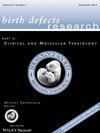Julia Kolarova, Susanne Bens, Ole Ammerpohl, Alina C. Hilger, Rong Zhang, Heiko Reutter, Reiner Siebert
下载PDF
{"title":"PLAGL1脱位和膀胱外翻:是巧合还是同时的病因?","authors":"Julia Kolarova, Susanne Bens, Ole Ammerpohl, Alina C. Hilger, Rong Zhang, Heiko Reutter, Reiner Siebert","doi":"10.1002/bdra.23521","DOIUrl":null,"url":null,"abstract":"<div>\n \n <section>\n \n <h3> Background</h3>\n \n <p>The bladder exstrophy-epispadias complex (BEEC) is characterized by a spectrum of genitourinary malformations. Both classical bladder exstrophy and the most severe phenotype, exstrophy of the cloaca, display omphaloceles, a cardinal anomaly of some disorders caused by altered imprinting. Therefore, we hypothesized that BEEC in some patients could occur on the basis of an undiagnosed imprinting disorder. Such altered imprinting is associated with changes in the parent-of-origin-specific DNA methylation.</p>\n </section>\n \n <section>\n \n <h3> Methods</h3>\n \n <p>We analyzed the DNA methylation of 54 imprinted loci in 23 selected patients with different BEEC subtypes (epispadias <i>n</i> = 1, classical bladder exstrophy <i>n</i> = 10, exstrophy of the cloaca <i>n</i> = 12) using the Infinium HumanMethylation450 BeadChip. A total of 471,722 not imprinted autosomal CpG loci and 891 imprinted CpG loci were investigated. Findings were corroborated by methylation-specific-multiplex ligation-dependent probe amplification (MS-MLPA) and microsatellite analysis.</p>\n </section>\n \n <section>\n \n <h3> Results</h3>\n \n <p>No significant differences in the DNA methylation of the not imprinted and imprinted CpG were observed depending on subtype of BEEC. Nevertheless, in 1 of the 23 patients who displayed a classical bladder exstrophy, we detected hypomethylation of the imprinted <i>PLAGL1</i> locus in chromosome 6q24. We verified this hypomethylation by MS-MLPA and showed further the methylation loss to be caused most likely by a mosaic epimutation.</p>\n </section>\n \n <section>\n \n <h3> Conclusion</h3>\n \n <p>Considering that it is highly unlikely to detect a <i>PLAGL1</i> epimutation among 23 individuals given the low incidence of this alteration in the population, our observations further support a link between BEEC and imprinting disorders. Birth Defects Research (Part A) 106:724–728, 2016. © 2016 Wiley Periodicals, Inc.</p>\n </section>\n </div>","PeriodicalId":8983,"journal":{"name":"Birth defects research. Part A, Clinical and molecular teratology","volume":"106 8","pages":"724-728"},"PeriodicalIF":0.0000,"publicationDate":"2016-05-25","publicationTypes":"Journal Article","fieldsOfStudy":null,"isOpenAccess":false,"openAccessPdf":"https://sci-hub-pdf.com/10.1002/bdra.23521","citationCount":"2","resultStr":"{\"title\":\"PLAGL1 epimutation and bladder exstrophy: Coincidence or concurrent etiology?\",\"authors\":\"Julia Kolarova, Susanne Bens, Ole Ammerpohl, Alina C. Hilger, Rong Zhang, Heiko Reutter, Reiner Siebert\",\"doi\":\"10.1002/bdra.23521\",\"DOIUrl\":null,\"url\":null,\"abstract\":\"<div>\\n \\n <section>\\n \\n <h3> Background</h3>\\n \\n <p>The bladder exstrophy-epispadias complex (BEEC) is characterized by a spectrum of genitourinary malformations. Both classical bladder exstrophy and the most severe phenotype, exstrophy of the cloaca, display omphaloceles, a cardinal anomaly of some disorders caused by altered imprinting. Therefore, we hypothesized that BEEC in some patients could occur on the basis of an undiagnosed imprinting disorder. Such altered imprinting is associated with changes in the parent-of-origin-specific DNA methylation.</p>\\n </section>\\n \\n <section>\\n \\n <h3> Methods</h3>\\n \\n <p>We analyzed the DNA methylation of 54 imprinted loci in 23 selected patients with different BEEC subtypes (epispadias <i>n</i> = 1, classical bladder exstrophy <i>n</i> = 10, exstrophy of the cloaca <i>n</i> = 12) using the Infinium HumanMethylation450 BeadChip. A total of 471,722 not imprinted autosomal CpG loci and 891 imprinted CpG loci were investigated. Findings were corroborated by methylation-specific-multiplex ligation-dependent probe amplification (MS-MLPA) and microsatellite analysis.</p>\\n </section>\\n \\n <section>\\n \\n <h3> Results</h3>\\n \\n <p>No significant differences in the DNA methylation of the not imprinted and imprinted CpG were observed depending on subtype of BEEC. Nevertheless, in 1 of the 23 patients who displayed a classical bladder exstrophy, we detected hypomethylation of the imprinted <i>PLAGL1</i> locus in chromosome 6q24. We verified this hypomethylation by MS-MLPA and showed further the methylation loss to be caused most likely by a mosaic epimutation.</p>\\n </section>\\n \\n <section>\\n \\n <h3> Conclusion</h3>\\n \\n <p>Considering that it is highly unlikely to detect a <i>PLAGL1</i> epimutation among 23 individuals given the low incidence of this alteration in the population, our observations further support a link between BEEC and imprinting disorders. Birth Defects Research (Part A) 106:724–728, 2016. © 2016 Wiley Periodicals, Inc.</p>\\n </section>\\n </div>\",\"PeriodicalId\":8983,\"journal\":{\"name\":\"Birth defects research. Part A, Clinical and molecular teratology\",\"volume\":\"106 8\",\"pages\":\"724-728\"},\"PeriodicalIF\":0.0000,\"publicationDate\":\"2016-05-25\",\"publicationTypes\":\"Journal Article\",\"fieldsOfStudy\":null,\"isOpenAccess\":false,\"openAccessPdf\":\"https://sci-hub-pdf.com/10.1002/bdra.23521\",\"citationCount\":\"2\",\"resultStr\":null,\"platform\":\"Semanticscholar\",\"paperid\":null,\"PeriodicalName\":\"Birth defects research. Part A, Clinical and molecular teratology\",\"FirstCategoryId\":\"1085\",\"ListUrlMain\":\"https://onlinelibrary.wiley.com/doi/10.1002/bdra.23521\",\"RegionNum\":0,\"RegionCategory\":null,\"ArticlePicture\":[],\"TitleCN\":null,\"AbstractTextCN\":null,\"PMCID\":null,\"EPubDate\":\"\",\"PubModel\":\"\",\"JCR\":\"Q\",\"JCRName\":\"Medicine\",\"Score\":null,\"Total\":0}","platform":"Semanticscholar","paperid":null,"PeriodicalName":"Birth defects research. Part A, Clinical and molecular teratology","FirstCategoryId":"1085","ListUrlMain":"https://onlinelibrary.wiley.com/doi/10.1002/bdra.23521","RegionNum":0,"RegionCategory":null,"ArticlePicture":[],"TitleCN":null,"AbstractTextCN":null,"PMCID":null,"EPubDate":"","PubModel":"","JCR":"Q","JCRName":"Medicine","Score":null,"Total":0}
引用次数: 2
引用
批量引用

 求助内容:
求助内容: 应助结果提醒方式:
应助结果提醒方式:


